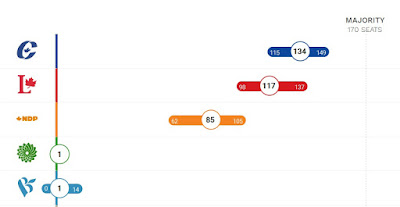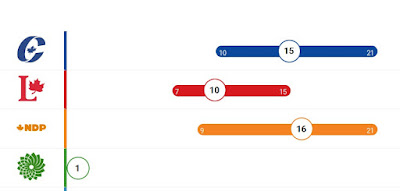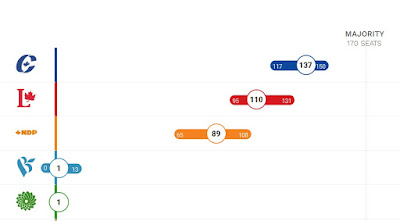Latest Abacus poll confirms surge of the Liberal Party continues in Battleground Ontario: Ontarians want a new government, that will handle the economy well, develop infrastructure, provide good governance, and act with decency. We will all get that kind of government on October 19. Vote in the advance polls (to
Continue readingTag: 2015 election
CuriosityCat: Abacus Oct 7: Liberal Surge in Ontario strengthening
Latest Abacus poll confirms surge of the Liberal Party continues in Battleground Ontario:Ontarians want a new government, that will handle the economy well, develop infrastructure, provide good governance, and act with decency.We will all get that kind…
Continue readingCuriosityCat: The Signal Oct 6: Tories 132 seats; Liberals 132 seats; NDP 71 seats
CuriosityCat: The Signal Oct 6: Tories 132 seats; Liberals 132 seats; NDP 71 seats
Trudeau has led his Liberal Party to a forecasted number of MPs equal to those that Harper’s tired Conservatives might elect: 132 MPs each. With neither the CPC nor the LPC having a majority of seats (170 MPs), this result would mean the end of the Harper government, and a
Continue readingCuriosityCat: Another 4 LPC seats and Harper resigns on October 19
CuriosityCat: Another 4 LPC seats and Harper resigns on October 19
The Poll Tracker for October 5 shows the steady surge of Liberal Party votes, and translates the various polls into a national seat projection. Harper told Peter Mansbridge that if the Conservatives won one seat less than any other party, he would immediately resign as prime minister. With two weeks
Continue readingCuriosityCat: Who is the Change Agent in Canada’s election? It’s no contest, really
CuriosityCat: Who is the Change Agent in Canada’s election? It’s no contest, really
Mulcair has only two weeks to reverse a dramatic reversal in the minds of voters of just who, in an election where about 70% of the voters want a change, bears the Change mantel. Harper is an also-ran in the Who is the best change agent stakes (offering less of
Continue readingCuriosityCat: Trudeau’s Message to Conservative Supporters
But I want you to keep something in mind. Always.
In the end, we are all Canadians.
Conservatives are not our enemies. They’re our neighbours.
They want what’s best for their country, just like we do. They want safe communities and a growing economy. They want better jobs and more opportunities for their kids. They want their country to stand for something in the world, with the tenacity to solve big problems.
We don’t need to convince them to leave the Conservative Party. We just need to show how Stephen Harper’s Party has left them…
What kind of country do you want to build?
What kind of Canada do you want to leave to your kids?
Do you want Stephen Harper’s unambitious vision of a small, fearful country? One where we are divided against one another and suspicious of the world.
Or do you want a confident, positive vision of Canada? One that is clear-eyed about the challenges we face, but optimistic that we have all that we need to meet them head on.
I believe in this country. I love it with all my heart. And I know you do too.
See: our campaign has never been about me. It has never been about the Liberal Party. It has always been about Canadians.
Once Harper resigns as prime minister on October 20, then Conservative supporters can start considering what type of leader they want for their party, and the dialogue can begin.
Continue readingCuriosityCat: Trudeau’s Message to Conservative Supporters
Today Justin Trudeau had a message for supporters of the Conservative Party that should resonate all the way up to the close of the polls on election night October 19: But I want you to keep something in mind. Always. In the end, we are all Canadians. Conservatives are not
Continue readingCuriosityCat: Red Tide moves towards Liberals in Quebec and in Ontario, says Nanos poll
The latest Nanos tracking poll for Sunday October 4 is very good news indeed! Please make sure everyone you know who wants change on October 19 gets a copy of this and also shares it with all their friends. Here’s the vital Battleground Ontario results: And here’s what’s happening in
Continue readingCuriosityCat: Red Tide moves towards Liberals in Quebec and in Ontario, says Nanos poll
The latest tracking by Nanos Research for CTV News and the Globe and Mail shows that, regionally:
- The Liberals lead in Atlantic Canada, with 52.1 per cent support, and in Ontario with 44 per cent support.
- The Conservatives lead in the Prairies, with 51.6 per cent support.
- In British Columbia, there is a tight race between the NDP (34.9 per cent) and the Liberals (34.3 per cent).
- The NDP lead in Quebec with 32.9 per cent, but support continues to slide.
The Tory Pirate - Politics & Policy: The NDP "is not planning any changes to our current form of the parliamentary system"
It is not often I get to talk about issues related to the monarchy on this blog. I mostly keep that on the other blog I writefor. However the Monarchist League of Canada recently surveyed the main federal parties on their views towards theCanadian Monarchy. One of the answers was
Continue readingCuriosityCat: Liberals surge to 43% in Battleground Ontario says Nanos
Here’s the Nanos latest poll: Nanos Nightly Election Tracking Highlights (3-day tracking ending October 2) – Federal Liberals trend up for last two nights of Nanos tracking National Ballot – In the latest Nanos tracking completed Friday evening the Liberals had 34.6% support followed by the Conservatives at 30.5%, the
Continue readingCuriosityCat: Liberals surge to 43% in Battleground Ontario says Nanos
Nanos Nightly Election Tracking Highlights (3-day tracking ending October 2) – Federal Liberals trend up for last two nights of Nanos tracking
- National Ballot – In the latest Nanos tracking completed Friday evening the Liberals had 34.6% support followed by the Conservatives at 30.5%, the NDP at 25.1%, and the Greens at 4.8% nationally.
- Battleground Ontario – There has been a noticeable movement in one of the key battlegrounds in favour of the Liberals over the past two evenings of tracking. Support for the Liberals in battleground Ontario stands at 43.6% while the Conservatives are at 33.8%, the NDP at 18.6% and the Greens at 4.0%.
CuriosityCat: The Signal for Oct 3: Non-Tory seats 202, Tory seats 134 Result? New government
If you have not bookmarked The Signal for your daily fix of the poll of polls, then do so immediately, and tell your friends to do so as well. As of today, October 3, a change of government on October 19 is even more certain than yesterday, because the LPC
Continue readingCuriosityCat: The Signal for Oct 3: Non-Tory seats 202, Tory seats 134 Result? New government
CuriosityCat: What will happen on election day? The Signal points the way: a change of government
Say welcome to a new poll of polls aggregator service named The Signal. It is one pollster that you will be checking on a daily basis in the 17 days left before our election on October 19. The Signal is a creation of Vox Pop Labs. This is how the
Continue readingCuriosityCat: What will happen on election day? The Signal points the way: a change of government
To gain a more precise picture of the voting landscape across the country, the Star has teamed with Vox Pop Labs, an independent research organization, to utilize their election forecasting tool, named The Signal.
Faith in pollsters’ findings has been tested in recent years, both home and abroad. After failed efforts to predict the Liberals win in the B.C. election of 2013, the Star asked “Why do pollsters keep getting it wrong?” Across the pond, British outlets pondered the same question only this year, when forecasters’ projections for the general election woefully undervalued support for David Cameron’s Conservative Party.
The important thing to note is this: The total of Liberal and NDP seats is 199, a huge margin over the projected seats of 137 for Harper’s ‘new’ Conservatives.
CuriosityCat: Niqab: In defence of Thomas Mulcair
 |
| Thomas Mulcair: Man of Principle |
Mr. Mulcair was asked a simple question, loaded with peril, and he answered it very clearly in the last debate on foreign affairs. His answer to the question whether he agreed with the federal court’s decision regarding the right of a woman to cover her face with a niqab was Yes.











